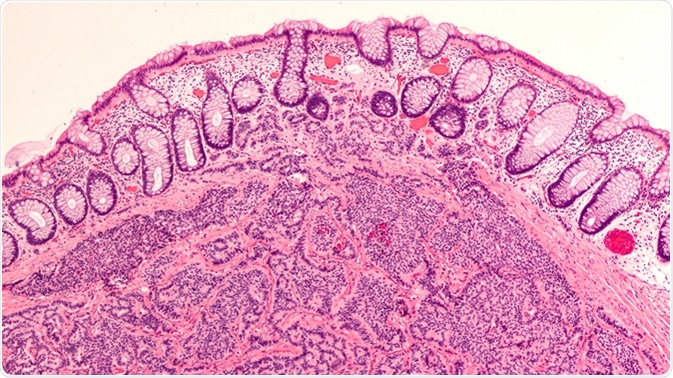Carcinoid tumors may sometimes be asymptomatic but may show symptoms in other patients. The signs of the illness are not definite and depend greatly on the location of the tumor. Hormones released into the blood by one out of ten carcinoid tumors are responsible for causing the symptoms of the illness.
Factors including stress, heavy exercise, and alcohol consumption lead to symptoms in several patients with carcinoid tumor.

Photomicrograph of a carcinoid tumor, a type of neuroendocrine tumor (NET), which presented as a colon polyp during routine colonoscopy. Spread to liver can cause symptoms of carcinoid syndrome. Image Credit: David Litman / Shutterstock
Primary Symptoms of Carcinoid Tumor
Tumors that occur in the endocrine system release hormones into the blood flowing in the circulatory system, which may also lead to many other issues, depending upon the type of hormone. Carcinoid tumors that prevail for long time may lead to carcinoid syndrome. Around 60% of patients suffer from carcinoid syndrome caused by a carcinoid tumor that has grown over a period of time.
The following are the symptoms that are seen in a patients suffering from carcinoid syndrome.
- Redness and flushing of the face
- Perspiration
- Diarrhea
- Dyspnea
- Heavy breathing and asthma-like symptoms
- Increased heartbeat
- Murmuring of heart
- Unexpected rapid weight gain
- Feebleness
- Induced diabetes
- Uncontrolled hair growth in body and face
- Hypertension and significant variations in blood pressure
- Neurosis is a mental disorder mainly defined by anxiety. Psychosis is also a mental illness which progresses to a mental ability to become crooked/misled and messed up. This intervenes with the people's capability to manage the basic day-to-day needs.
Carcinoid Tumors
Lung Carcinoid Tumor Symptoms
Lung carcinoid tumor symptoms can be identified clinically from the symptoms revealed in at least two of three people who have acquired carcinoid tumor. As carcinoids progress at a slow pace, the symptoms often go by unnoticed for many years and are often detected by medical procedures used to diagnose/treat other conditions. A person suffering from lung carcinoid tumor shows signs of the illness because of the hormones entering the bloodstream, bypassing the liver. Lung carcinoid tumor does not cause carcinoid syndrome, which is generally the case with GI tumor.
The symptoms of the lung carcinoid tumor are:
- Cough, with or without bloody sputum or phlegm
- Chest pain
- Wheezing
- Shortness of breath
- Diarrhea
- Redness or flushing
- Rapid weight gain, specifically over the midsection and upper back
- Pink or purple stretch marks on the skin
- Post-obstructive pneumonia caused by blockage of tumor in a large air passage, leading to an infection.
Symptoms of Digestive Tract Carcinoid Tumors
Digestive tract carcinoid tumor symptoms include:
- Abdominal pain
- Diarrhea
- Nausea, vomiting, and inability to pass stool due to intestinal blockage (bowel obstruction)
- Rectal bleeding
- Rectal pain
- Skin flushing
Location-Based Symptoms
The position of the gastrointestinal (GI) carcinoid tumor determines the symptoms that present.
The small intestine or colon: A tumor in the small intestine or colon causes the intestine to bend and may block it temporarily. The bend and blockage cause recurrent cramps, abdominal pain, loss of weight, fatigue, bloating, loose bowels, nausea, and vomiting. This can sometimes go unnoticed for several years until the tumor is detected. A complete intestinal blockage occurs only when the tumor is sufficiently big. A block in the opening of the hepatopancreatic ampulla through which the bile duct from the liver and pancreatic duct from the pancreas drain into the intestine occurs in some cases of carcinoid tumors.
This block allows the bile to flow backward, which causes yellowing of the skin and eyes—termed as jaundice. In addition, pancreatic juices flow back to pancreas and inflammation occurs, which causes pain in the abdomen, nausea, and vomiting. The cancer also leads to intestinal bleeding, which in turn reduces the RBC level and causes anemia along with fatigue and dyspnea.
The appendix: People with tumors in the appendix usually do not show symptoms. The tumor can be found only during the surgical removal of the appendix, for example, in the case of appendicitis. In some cases, the tumor develops and blocks the opening between the appendix and the lower part of the intestine, leading to appendicitis causing symptoms such as nausea, vomiting, and pain in the abdomen.
The stomach: Carcinoid tumors in the stomach tend to develop gradually, and generally no symptoms are seen. However, they can be diagnosed even during endoscopic examination of the stomach for other reasons. Few show symptoms such as carcinoid syndrome.
The rectum: A tumor in the rectum is usually detected by regular examination despite the occurrence of pain in and loss of blood from the rectum and constipation.
Carcinoid Crisis
If all the carcinoid symptoms appear simultaneously, it leads to a life-threatening and severe condition defined as carcinoid crisis. In most cases, it appears following a person experiencing the symptoms of the syndrome. Carcinoid crisis may take place abruptly or can be induced by stress, chemotherapy, or anesthesia. This can be obviated and treated with a hormone drug called Sandostatin (octreotide), which aids in increasing the blood pressure and regulates the hormone secretion.
Further Reading
Last Updated: Aug 23, 2023